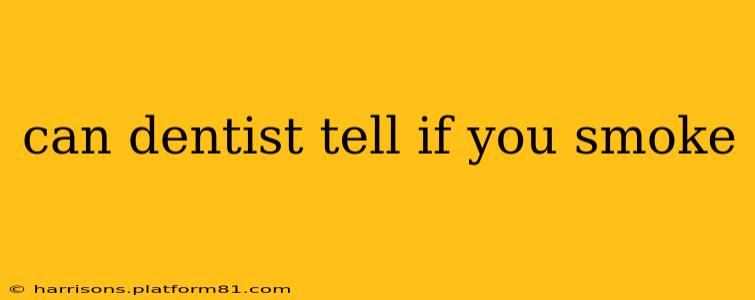Can a Dentist Tell if You Smoke?
Yes, dentists can often tell if you smoke, and not just from the smell. While a lingering smell of cigarettes on your breath is a clear indicator, dentists have several other ways to detect smoking habits during a routine checkup. This knowledge is crucial for assessing your overall oral health and recommending appropriate preventative measures or treatments.
How Can a Dentist Detect Smoking?
Dentists utilize a combination of visual observations and sometimes supplementary tests to identify smokers. Here are some key signs:
1. Visual Examination of the Mouth:
- Stained Teeth: This is perhaps the most obvious sign. Smoking stains teeth a yellowish-brown color, and the staining can be quite persistent, even with diligent brushing and flossing. The staining pattern is often unique to smoking, allowing dentists to differentiate it from other causes of discoloration.
- Receding Gums: Smoking significantly increases the risk of gum disease (periodontal disease). During a check-up, dentists carefully examine the gums for signs of recession, inflammation, and bleeding. Receding gums are a characteristic symptom of advanced gum disease often linked to smoking.
- Halitosis (Bad Breath): The persistent odor of smoke on a patient's breath is a clear indication of smoking. While bad breath can have other causes, the characteristic smell of tobacco is unmistakable.
- Oral Lesions: Smoking can increase the risk of developing certain oral lesions or sores. Dentists will carefully examine the oral mucosa (the lining of the mouth) for any unusual growths, discoloration, or lesions that may be linked to tobacco use.
- Reduced Salivation: Smoking can decrease saliva production, which can lead to dry mouth and an increased risk of cavities and gum disease. A dentist might notice a dry mouth during the examination.
2. Medical History and Self-Reporting:
- Patient Questionnaire: Many dental practices include questionnaires that ask about lifestyle habits, including smoking. Honest self-reporting is crucial for accurate assessment and personalized care. Even if not explicitly asked, patients are often encouraged to be upfront about their health habits during consultations.
3. Additional Tests (Rarely Necessary):
While visual examination is usually sufficient, in rare cases, a dentist might recommend additional tests to assess the severity of smoking-related damage, particularly concerning gum disease. This might involve X-rays to check for bone loss or other diagnostic tools depending on the specific situation.
What are the Oral Health Risks Associated with Smoking?
Smoking significantly increases your risk of numerous oral health problems, including:
- Gum disease: Leading to tooth loss
- Oral cancer: Including cancers of the lips, tongue, gums, and throat
- Tooth decay: Due to reduced saliva and increased bacterial growth
- Delayed wound healing: After dental procedures like extractions or surgeries
- Implant failure: Reduced success rates for dental implants
Can a Dentist Tell How Much You Smoke?
While a dentist can’t pinpoint the exact number of cigarettes smoked daily, the severity of the visual signs (stained teeth, gum recession, etc.) can give an indication of the extent of tobacco use and the associated oral health risks.
Can a Dentist Tell if You've Quit Smoking?
Yes, to a certain degree. While the stains on teeth won't disappear overnight, dentists will observe improvements in oral health over time if a patient has stopped smoking. They'll likely see reduced inflammation in the gums, and new bone growth might be evident in X-rays. The overall improvement in oral health will serve as a positive indication of the cessation efforts.
In conclusion, while not always definitive, dentists possess considerable expertise in identifying smoking habits through a combination of visual observation, patient history, and sometimes additional diagnostic procedures. Open communication with your dentist is key to maintaining optimal oral health.
